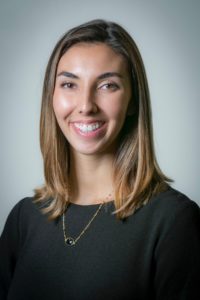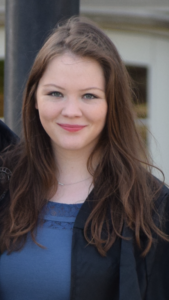The Undergraduate Awards—often referred to as the “junior Nobel Prize”—has announced the winners of its 2017 program, and three UT students are ranked among the world’s best and brightest.
The Undergraduate Awards (UA) is the world’s largest international academic awards program, recognizing excellent research and original work across the sciences, humanities, business, and creative arts. The top 10 percent of students in their respective categories are honored as Highly Commended. Regional Winners are then chosen from each of the seven regions in the competition, and a final Global Winner is selected in each category.
UT’s winners were Alexandra Brito, a May 2017 graduate, who was named a Global Winner; Sierra Roark, also a May graduate, who was a Regional Winner; and senior Rachel Hunt, who was Highly Commended.
All winners are invited to attend the Global Summit, which will be held Nov. 7–9 in Dublin, Ireland. As a Global Winner, Brito will receive an all-expenses-paid trip to the Global Summit, where she will be presented with a gold medal by Michael Higgins, president of Ireland.
“We are so proud of our students and what each of them has accomplished,” said Marisa Moazen, director of undergraduate research. “The Undergraduate Awards provides an international forum for our students to share and be recognized for their academic achievements. All UT students have the opportunity to participate in undergraduate research, so we would love to see the honor that UA has bestowed to Alex, Sierra, and Rachel for their hard work be given to another class of UT students in 2018.”
Here’s more about UT’s winners:
Alexandra Brito, of Nashville, Tennessee, earned her bachelor’s degree in neuroscience, neurolinguistics, and French. She was the Global Winner in the language and linguistics category.
Brito’s research explored the impact of two different foreign language-learning environments—traditional classroom exposure and immersion learning through study abroad—on differences in brain processing between French learners. She is spending this year working as a clinical trials specialist in a brain stimulation research lab at Duke University Medical Center, with plans to attend medical school in fall 2018. At UT, she was a Haslam Scholar and a Fulbright semifinalist.
“I was honored to receive recognition for my undergraduate research project,” said Brito. “After spending three years learning the techniques and one year carrying out my project, it was exciting to finally put results on paper and have them published and recognized through the UA. In a small way, I now feel like part of the conversation about second-language learning in the field of neurolinguistics. I am very grateful to my mentor, Harriet Bowden, associate professor of modern foreign languages and literatures, who taught me everything I know about EEG and helped me carry out this project.”
Sierra Roark, of Collierville, Tennessee, earned her bachelor’s degree in history and is now pursuing a doctorate in anthropology and archaeology at the University of North Carolina at Chapel Hill. She was a Regional Winner for the United States and Canada in the classics and archaeology category.
Roark’s research identified wood charcoal collected from the archaeological excavation of a 17th-century colonial site in Virginia led by Barbara Heath, associate professor of anthropology. By looking at wood c
harcoal and other plant remains, she worked toward fostering a greater understanding of how people, both today and in the past, interacted with their environment.
Rachel Hunt, of Burke, Virginia, who is majoring in interior architecture with plans to graduate in May 2018, was Highly Commended in the architecture and design category.
Her portfolio submission, Herbaria, focused on bioluminescent organisms and how they use light to set a schedule and react to environmental changes. This research was applied to working environments in research facilities to suggest that using changes in lighting relative to the natural circadian rhythm might help employees work more efficiently.
About the Undergraduate Awards
UT had more submissions in the architecture and design category than any other institution in the United States and Canada.
UA this year received a record 6,432 entries representing 299 institutions, 47 countries, and 117 different nationalities. Students from the United States and Canada, submitted 1,423 of those entries.
Students interested in learning more about The Undergraduate Awards program should contact the Office of Undergraduate Research at 974-8560 or ugresearch@utk.edu.
—
CONTACTS:
Erin Chapin, 865-974-2187, erin.chapin@utk.edu
Amy Blakely, 865-974-5034, ablakely@utk.edu


